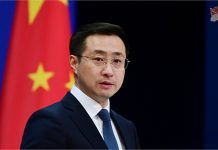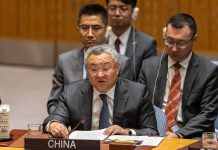From Chen Feng
State leaders of the Shanghai Cooperation Organization (SCO) will convene in Astana, the capital of Kazakhstan, from July 3 to 4. The SCO is currently the largest regional cooperation organization in the world in terms of both territory and population. However, in recent years, whenever the SCO holds a summit, some Western media, still holding onto a Cold War mindset, speculate that the SCO will develop into an “anti-Western alliance led by China and Russia” or “a NATO of the East”.
For example, when CNN reported last year’s virtual summit of the Shanghai Cooperation Organization hosted by Indian Prime Minister Narendra Modi, it underlined that “Both Moscow and Beijing view the group as an alternative to Western-led blocs and a key vehicle for their bid to push back against what it sees as a US-led world order.”
The reality is that the SCO is not “the NATO of the East”. From an organizational nature standpoint, NATO was inherently a military organization. It was established in 1949 with the stipulation that any armed attack on one member should be considered an attack on all members.
On the other hand, the SCO is primarily a cooperation organization in the fields of politics, economy, and security. Since its establishment in 2001, there exists no military obligation binding the member states, unlike NATO.
As early as 2012, when the SCO entered its second decade, Cheng Guoping, the then Vice Foreign Minister of China, emphasized in his keynote speech at the 6th Lanting (Blue Hall) Forum that the SCO was established to maintain peace and stability in the region and promote cooperation and development among member countries. It follows the “Shanghai Spirit” of “mutual trust, mutual benefit, equality, consultation, respect for diverse civilizations, and pursuit of common development”.
Therefore, it is not appropriate to compare the SCO to NATO as the SCO is a political, economic and security cooperation organization that does not have military functions.
The SCO has indeed held joint military exercises such as the “Peace Mission” exercises which have become a well-known brand worldwide.
However, these military exercises within the framework of the SCO are all aimed at maintaining regional security and handling crises, while adhering to the principles of non-alignment, non- confrontation, and not targeting any third parties.
All previous “Peace Mission” exercises have primarily focused on the theme of “counter-terrorism”, which is not only reflected in the name of the exercises, but also in their military composition, army equipment, and exercise tactics, fully showcasing the SCO as a partnership-oriented but non-aligned regional organization.
From a practical perspective, the presence of NATO has been known for its destructive interventions. In the past few decades, NATO has contributed to conflicts and instability in various regions, such as the former Yugoslavia, Libya, Iraq, and Syria, severely hindering global peace and stability. History will never forget that on the evening of May 7, 1999, NATO, led by the United States, blatantly bombed the Chinese Embassy in the then Federal Republic of Yugoslavia. Three Chinese journalists died on the spot and dozens were injured. During the 78 days of unauthorized bombing, over 2500 people were killed and 1 million were displaced.
The SCO, on the other hand, was established to combat “three forces” of terrorism, separatism and extremism, and its original intention was to solve the problems left over from the Cold War period and to address non-traditional security threats faced by the region. It can be said that the SCO plays a crucial role in maintaining regional security and stability.
In terms of expansion, NATO is led by the United States and comprises mainly developed Western countries. After the outbreak of the Russia-Ukraine conflict, Finland and Sweden rushed into the Treaty, with an obvious intention to contain Russia as well as defend themselves. The future game surrounding Ukraine’s accession to NATO will inevitably trigger rounds of political and military turmoil on the continent.
Meanwhile, the vast majority of SCO members are developing countries prioritizing economic development as their primary focus. Each member state hopes to strengthen cooperation and seek common development. The SCO’s expansion process is gradual, no matter it is the inclusion of India, Pakistan, and Iran, or the expected accession of Belarus at this year’s summit, and has a legal basis.
All in all, any comparison between the SCO and NATO by some Western media such as CNN is not only a misunderstanding of the organization, but also a deliberate smear. The notion that the SCO opposes the West itself reflects an outdated Cold War mindset and leads to a misjudgment of the organization.
Furthermore, it is worth noting that Türkiye, a member of NATO, is also a dialogue partner of the SCO, which not only underscores the organization’s inclusive approach, but also says something loudly.






